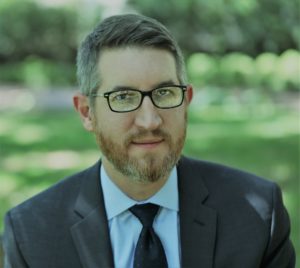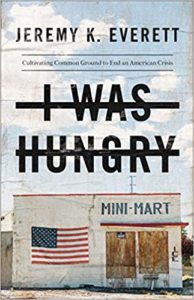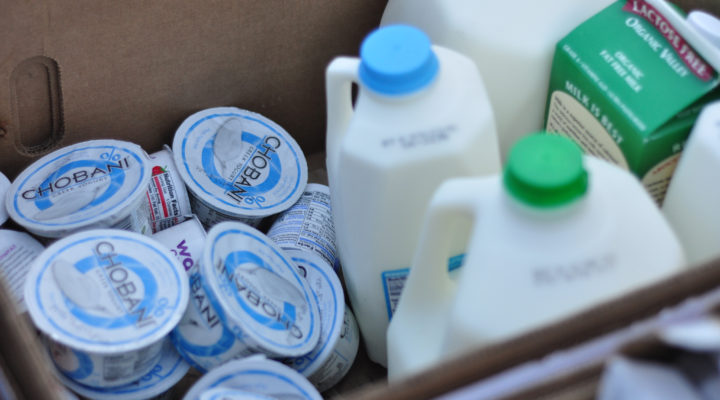It may sound far-fetched, but Jeremy Everett believes that hunger can actually be eradicated.
Everett has extensive passion and experience in the realm of combating hunger. He is the founding executive director of the Texas Hunger Initiative at Baylor University, a senior fellow with World Hunger Relief, and serves as a member of the National Commission on Hunger.

Jeremy Everett
He’s also writing a book, scheduled for publication in August 2019, titled I was Hungry: Cultivating Common Ground to End an American Crisis.
Yes, end, Everett said.
He cites the successful effort of William Wilberforce to end slavery in England, and the civil and political gains of Martin Luther King and Mahatma Gandhi.
Everett also points to disaster relief efforts as examples of secular, religious and governmental cooperation to accomplish major tasks.
He’s convinced that can also work to battle hunger.
“It’s about all of us working together,” Everett said. “It takes all hands on deck, whether it’s the hunger we see across the nation or with the migration we are experiencing on the Texas-Mexico border.”

(Photo/Amazon.com)
In the book, Everett lays out a hunger-free community campaign, launching this fall with the book’s release. It delves into deeply held misconceptions about the poor and hungry.
“For the most part we have scapegoated a class of people and use them to bear all the burdens of our society, so that we can go on living relatively easy lives,” he said.
Everett also presents scriptural and theological arguments to inspire people of faith to lead or join collaborative efforts to eradicate hunger. For Christians, he added, it’s a gospel imperative to help the poor and hungry.
“We finally have to say enough is enough,” he said.
Everett spoke with Baptist News Global about his book and the struggles with poverty and food insecurity. His comments have been edited for clarity.
How do you define “food-insecurity”?
Food-insecure is the USDA’s technical definition, which it uses to measure hunger. If an individual or family experiences food insecurity, that means they don’t have enough food to live a healthy lifestyle. It’s typically episodic for most families, typically at the end of a pay period. So, they are forced to make trade-offs. Paying rent, making a car payment, playing for medication – or food. You don’t get evicted if you don’t buy food. You don’t lose your car if you don’t buy food.
Are there ranges or degrees of hunger?
Very low food-security is somebody who is regularly missing meals. Normally, it’s going to be parents choosing to eat one meal a day or skipping a day or two so their kids can have food. And you hear stories of kids having a meal at school on Monday, and whose previous meal was at school on Friday.
You’ve described hunger as a complex issue. What’s complex about it?
You have to think about hunger as a symptom of the larger issue of poverty. The main issue with poverty ultimately is that people need to be making more money to be more food-secure. You’re dealing with wage rates. You’re dealing with employment opportunities. It’s all more than any one problem, and more than any one individual is going to be able to address. Most of the time, when families are food-insecure and are getting food from a food pantry, that is not going to meet their food needs over the course of a month or months. So, it takes us all working together. We have experienced hunger and poverty almost throughout the history of humanity. Some government officials say it isn’t government’s job, it’s churches’ job. And some in the church say it’s not churches’ job. It’s going to take public and private sectors working together to eradicate hunger in our lifetime.
Is there anything new in recent years about hunger in the U.S.?
I think what’s new is stagnating wages. With the rate of inflation, we are not seeing the rate of wages increase at the same rate for people on the bottom of the socioeconomic spectrum in the U.S. We see more wealth being created, and it’s great to have low unemployment. But if you are making minimum wage, it’s not going to feed a family of four. That barely covers rent and transportation costs.
Hunger doesn’t seem to get much ink these days. Is it simply lost in the noise of high-profile controversies and scandals?
We are a nation with a 24-hour news cycle. Our attention span is not exactly a long one, and every day there is always a crisis. It’s like ending every sentence with an exclamation point. The problem is you have this persistent problem of poverty which manifests itself in a lack of food or a lack of housing, and it’s become so much the norm that we forget it doesn’t have to be this way. We’re used to driving past poor neighborhoods or seeing people holding signs saying, “will work for food.” Hunger is just like Tuesday – it’s just a normal occurrence. We somehow fail to empathize with people who are having to get up and tell their kids, “I’m sorry we don’t have any food to eat.” That breaks your heart.
If you were given an unlimited budget, how would you campaign against hunger?
The first phase would be providing additional resources for work-support programs. It would be a program like the SNAP program, which provides resources on an electronic benefits card so people could purchase food adequately. It would be providing resources that people could use every day as a first step toward a larger plan addressing poverty comprehensively. It would make sure kids get three meals a day at school and would provide robust summer meals programs and some extra resources for families when kids are out of school. And it would be the same thing for our senior adults living on fixed incomes.
Long term, it’s about education. It’s about making sure we are providing our kids a quality education, which to move out of poverty would include graduation from high school and an additional degree – college or a two-year technical degree — or additional training to provide the experience needed for gainful employment. Something that will set them up well for financial success.
Is there any possibility that the necessary collaboration can be reached to eradicate hunger?
We know this is an issue that can unite communities on a local level. Outside Washington, it’s something that unites us and it’s something conservatives and progressives care about equally. This is why we think it’s a unifying issue. We may not end poverty in the next decade, but I think we can take some significant steps toward reducing food-insecurity in the United States and around the globe.
Is the book meant to be largely informative, or does it present a strategy of some kind?
Really both. I think we need a better cultural understanding of poverty and who is poor. A lot of people in congregations across the U.S. might have feelings that are just not accurate, like the poor are lazy and not working. I try to challenge that notion. I have lived and worked in low-income communities. I use research to explain who is in poverty in the U.S. I do a little bit of exegetical work with biblical passages, including Matthew 25, obviously. And I get into solutions for local communities.
Related story:
Liberation theologian prompts Baptist minister’s ‘Franciscan conversion’ to serve the poor


